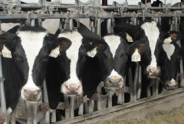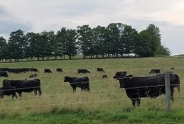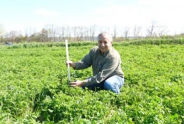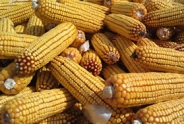Field Crop Update June 24, 2021
Erik Smith, Area Field Crop Specialist/Team Leader
Central New York Dairy and Field Crops
1. Field Observations
Alfalfa weevil is out, and potato leafhopper is in. The rainy weather prevented me from doing my scouting earlier this week, so I'm going out tomorrow to check on a few fields. That said, we had low levels of PLH last week, so numbers are may be higher this week (if the rain didn't knock them back, which is not uncommon). So be on the lookout for yellowing at the tips of your alfalfa. If you're within a week of harvest, that will be your best, most economical method of control. Click this link for a video on scouting and action threshold info: Potato Leafhopper Scouting and IPM Thresholds in Alfalfa
Most corn I've seen has been V4-V6, and the next few days will be perfect corn conditions for many of us: warm, but not too warm, and good soil moisture.
Soybeans are looking excellent, but folks in western NY have seen some early infestations of soybean aphid (below). While this looks alarming, you're unlikely to see an economic benefit from spraying this early. From the late vegetative stages to R4, the threshold is an average of 250 aphids per plant and actively increasing. See this guide for scouting information.

See this week's Oneida County Ag Report and Capital Area Ag Report.
2. Growing Degree Days as of June 2nd (See: Climate Smart Farming Growing Degree Day Calculator)
Growing degree days (GDD) are calculated by taking the average daily temperature and subtracting the base temperature for development of a given organism ((High + Low)/2 - base temp = GDD). For corn silage, we are using base 50/86, as corn development starts at 50 degrees F and ceases above 86.
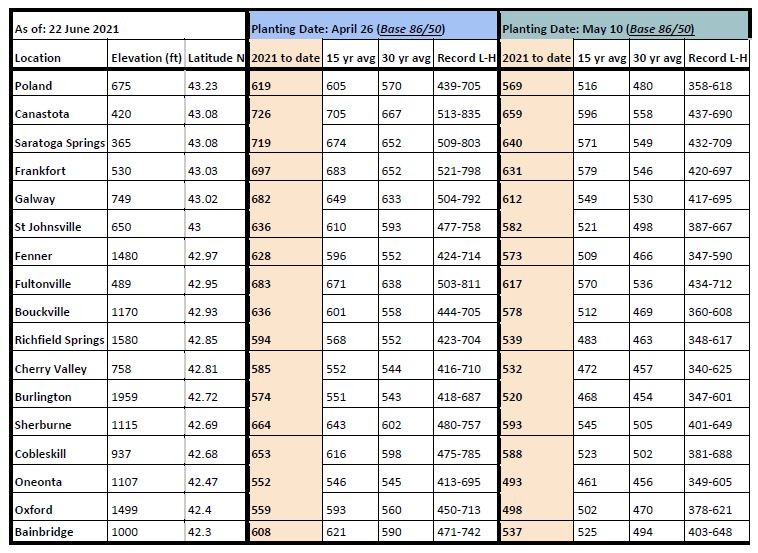
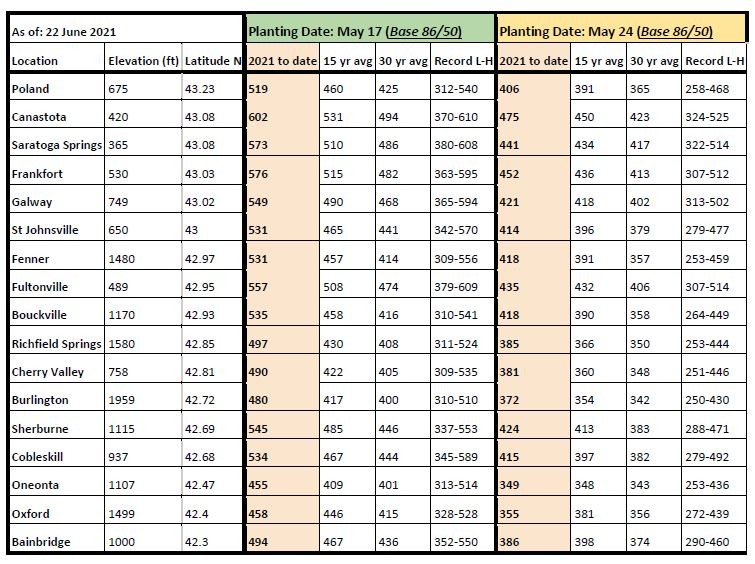
Still unchanged, folks in Fulton, Herkimer, and northern Madison counties are still in the "abnormally dry" category in the drought monitor. Please see the attached document from Joe Lawrence, PRO-DAIRY, for resources for forage management in a drought situation.
We're forecast to have warm temperatures through the weekend with scattered thunderstorms all of next week. Consider taking second cutting now if you're close, or you may not have another clear opportunity until the beginning of next month.
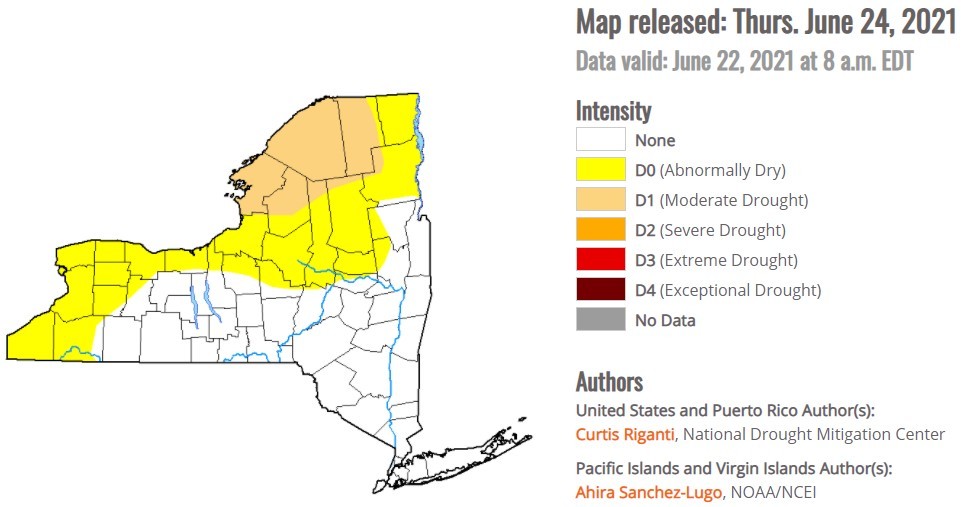
3. Pest Monitoring
This year we will again monitor for several pests of corn and soybean using pheromone-baited traps, including black and western bean cutworms, true armyworm, and the invasive soybean pests (and as-of-yet undetected) silver Y moth and golden twin spot moth.
Traps were completely clean this week. We'll get our first western bean cutworm numbers next week.


From this point on, we will begin to monitor for western bean cutworm and will continue to monitor true armyworm for another month.
The image below shows the current risk for fusarium head blight in winter wheat (green = low risk, orange/brown = high). Chenango and Saratoga Counties and the central Mohawk Valley remain in the moderate risk range, while the risk has passed for the rest of our region.
I've seen some very early signs of Septoria brown spot on soybeans, but like other pests and diseases, the critical time for crops is during the reproductive stages. Dry weather can prevent infestation of the upper canopy, but we will continue to monitor these fields as the season progresses. Nothing to worry about at this point.
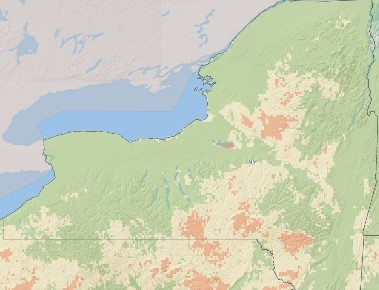
Click here to sign up to receive this information directly in your email each week.
Resources for Forage Management in a Drought Situation (pdf; 1003KB)
Upcoming Events
Passing the Torch - Planning Your Farm's Future
January 27 - January 28, 2026
Choose from two locations for this FREE event.
I Thought I Was Covered for That! - Farm Insurance Webinar Series
January 13, 2026
January 20, 2026
January 27, 2026
February 3, 2026
February 10, 2026
Free Webinar Series
Pesticide Applicator Exam Prep Course
February 2, 2026 : Pesticide Applicator Exam Prep Course - Ballston Spa
Ballston Spa, NY
February 5, 2026 : Pesticide Applicator Exam Prep Course - Cobleskill
Cobleskill, NY
February 6, 2026 : Pesticide Applicator Exam Prep Course - Herkimer
Herkimer, NY
February 9, 2026 : Pesticide Applicator Exam Prep Course - Morrisville
Morrisville, NY
February 13, 2026 : Pesticide Applicator Exam Prep Course - Norwich
Norwich , NY
Announcements
Statewide Field Crop Pathology Needs Assessment Survey
Your input is wanted for identifying priorities!Sign Up for Our Weekly E-Newsletter
We send out a bi-weekly e-newsletter that has announcements, upcoming programs, and opportunities for you! Registration is quick, easy, and free. Click here to sign up today!Farmers Can Join MeatSuite For Free!
MeatSuite.com is a free resource provided by Cornell University where NY meat farmers can create a farm profile and list their bulk (wholes, halves, quarters) and bundled (i.e. Grilling Bundle) meat products.Why should farmers join?
1. It's free and easy!
2. Connect with more local customers. In the past year the MeatSuite.com farm directory had 8,300 visits from New York consumers. Farm profiles get as many as 25 views per month from potential local customers. We also spotlight MeatSuite farms on social media and bring attention and purchases to farms through highlights and giveaways.
How do I join?
Farmers can visit https://www.meatsuite.com/farmers/ to create a free farm profile. You must list at least one product for your farm's profile to go live. You'll also have access to Cornell's free Meat Price Calculator, a helpful tool for pricing your meat to make a profit.
While you're on MeatSuite, check out the "Creating Consumer-Friendly Bulk Meats" publication on the log-in page. It has tips on how to create bulk meat products that are easier for first-time buyers to say "yes" to.
If you have any questions as you create your farm profile or products, we're here to help! Please email Matt LeRoux at mnl28@cornell.edu.

